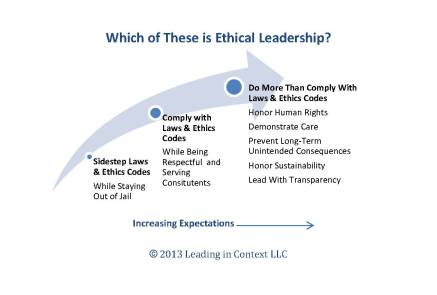By Linda Fisher Thornton
What is ethical leadership? I have been exploring that question on the Leading in Context Blog for the last four years. This week, I’ve chosen some highlights from popular posts to illustrate what leading in a complex world requires of each of us.
Leading ethically in a global society requires much more than following laws and regulations. We must take on a global mindset, maintain an openness to learning, actively build trust, and so much more.
We must move away from a compliance mindset, and reach for a values-based mindset that considers much more (see the highest level on this three-level graphic).

Expectations Beyond Compliance and Laws
“Following laws and regulations is just above the punishment threshold for ethical leadership. Expectations are moving to a much higher level, a level at which we are expected to do much more. Look at the third level, the highest level of the graphic. Aren’t transparency, sustainability and honoring human rights now expected of all businesses? I believe they are, and there are other factors we need to consider that are not on this list. The minimum standard is gradually moving to a higher level as we better understand the impact of our choices on others in a global society.”
Linda Fisher Thornton, Which of These is Ethical Leadership?
Openness to Learning
“When we are not open to learning, we can easily misinterpret another perspective that does not match our own as a threat. That perspective that we are actively arguing against may in fact reflect a more current, more advanced, or more ethical perspective than ours. Failing to acknowledge that there are other perspectives on an issue (and that the people who hold them have a right to their views as much as we do) shows a lack of respect, and a lack of awareness…”
Linda Fisher Thornton, Civility and Openness to Learning
Inclusion
“Managing diversity without inclusion as the ultimate goal can make a big difference in the way employees experience our organization. We choose a way of thinking that represents what we’re trying to do and then build a process/program/structure or measurement based on that foundation. If diversity is our way of thinking, we may get an approach based on “differences,” rather than one based on creating an inclusive culture where a diverse group of people can do their best work.”
Linda Fisher Thornton, Differences or Inclusion: Which Are We Focusing On?
Service and Care
“One of the elements of ethical leadership that may be overlooked when we view ethics using a “legal lens” is supporting and developing the potential of the people we lead. While many leadership ethics programs focus on the risk side of ethics – compliance with laws and regulations, avoiding lawsuits, etc., there is an equally important side of ethics that involves care.” Linda Fisher Thornton, Ethical Leaders Care
A High Trust Environment
“On the surface, it doesn’t seem that curiosity and imagination are related to ethics. But think about what would happen in an environment where people were not able to use them. Could employees still be relied on to consistently behave ethically in an environment where they were not engaged in their work, and where they did not feel respected or fairly treated?”
Linda FIsher Thornton, Curiosity and Imagination Necessary Ingredients in Ethical Business
A Global Mindset
“When we see the world as a global society, we see that we need to act as if what happens to others, even people we may never meet, matters. We all share space, food and natural resources. We also share international communication and transportation systems and a global economy. Thinking about our planet as home to a global society, it is clear that we must act as if what happens to the environment matters. Our survival is dependent on the limited resources we have available and how responsibly we use them.”
Linda Fisher Thornton, Ethical Leadership and… a Global Society
Honoring Human Rights
“As leaders, we are expected to protect human rights in all that we do. In our quest to lead responsibly, we must continually consider the question “How do we need to change in order to better honor human rights?” If you are in the process of developing a corporate human rights policy, A Guide for Business: How to Develop a Human Rights Policy (UN Human Rights, Global Compact) is helpful in beginning the discussion.”
Linda Fisher Thornton, Honoring Human Rights is Essential
Staying ready to lead ethically in a globally networked world will require continual learning and a broad understanding of what ethical responsibility includes. Let’s get started…

For more, see Linda’s book 7 Lenses and the 21 Question Assessment: How Current is My Message About Ethics?
 2014 Bronze Axiom Business Book Award Winner
About 7 Lenses
Info@LeadinginContext.com @leadingincontxt @7Lenses
2014 Bronze Axiom Business Book Award Winner
About 7 Lenses
Info@LeadinginContext.com @leadingincontxt @7Lenses
© 2013 Leading in Context LLC
Reblogged this on Gr8fullsoul.
LikeLike
Thank you so much, Greg! I see that you posted that your forthcoming book took you 3 years to write. It could be worse – mine took 4. Congratulations for being at this point in the process!
LikeLike
LInda. Your postings are brilliant. We just completed a comprehensive study of companies going through transformations and ethics is the most critical cornerstone for success in the future.
LikeLike